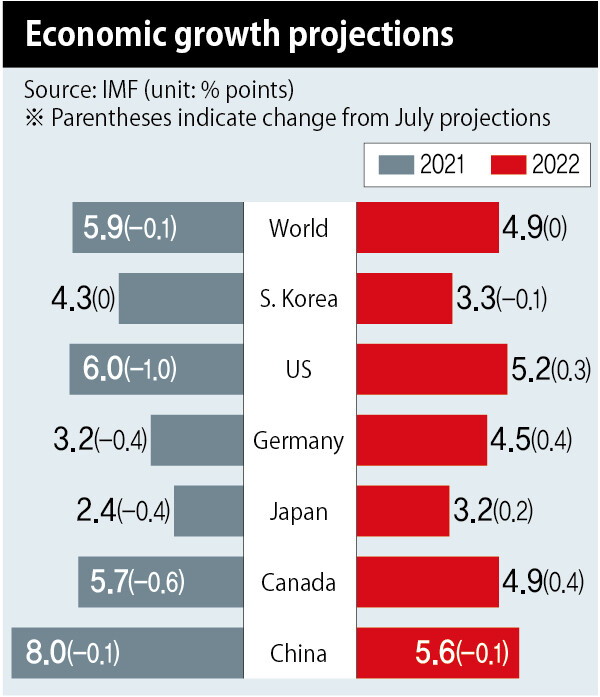hankyoreh
Links to other country sites 다른 나라 사이트 링크
IMF cuts global growth outlook, S. Korea predicted to stay steady at 4.3%

The International Monetary Fund (IMF) now predicts that the global economy will recover somewhat slower than it projected three months ago. Growing concerns about inflation and global supply chain interruptions that received less attention at the time of their last projection account for the change. The IMF also slightly lowered its forecast for South Korea’s growth rate next year.
In an update to the “World Economic Outlook” published on Tuesday, the IMF said the economic recovery is proceeding slower than originally projected, downgrading its forecast for this year’s global economic growth rate by 0.1 percentage point from its July forecast of 5.8%.
The IMF now expects the US to see a growth rate of 6.0%, a full 1 point lower than its earlier estimate. The agency also trimmed its projections for economic growth in Germany (3.2%) and Japan (2.4%) this year by 0.4 points each and in the UK (6.8%) by 0.2 points. As for South Korea, the IMF maintained its previous forecast of 4.3% for this year’s rate, while reducing its forecast for next year’s growth rate by 0.1 percentage point to 3.3%.
The IMF attributed its across-the-board downgrade of growth rates to the possibility that global supply chain disruptions will cause inflation.
“Pandemic outbreaks and weather disruptions have resulted in shortages of key inputs and dragged manufacturing activity lower in several countries,” wrote Gita Gopinath, the IMF’s chief economist. “These supply shortages [. . .] have caused consumer price inflation to increase rapidly in, for example, the United States, Germany, and many emerging market and developing economies. Food prices have increased the most in low-income countries [. . .] raising the risk of social unrest.”
Gopinath added that central banks in various countries need to plan for a potential increase in inflationary pressure and, if such an increase is confirmed, to act accordingly to ease uncertainty and secure their credibility.
“With fiscal space becoming more limited in many economies, health care spending should continue to be prioritized,” Gopinath wrote, along with support for employment and retraining.
The IMF stressed the need for international cooperation, given the gaps between countries in their fiscal response and their supply of COVID-19 vaccines.
“The pandemic is not over anywhere until it is over everywhere,” Gopinath observed, while calling for “efforts to ensure equitable vaccine access for every country.”
By Lee Jeong-hun, staff reporter
Please direct questions or comments to [english@hani.co.kr]

Editorial・opinion
![[Editorial] Intensifying US-China rivalry means Seoul must address uncertainty with Beijing sooner than later [Editorial] Intensifying US-China rivalry means Seoul must address uncertainty with Beijing sooner than later](https://flexible.img.hani.co.kr/flexible/normal/500/300/imgdb/original/2024/0517/8117159322045222.jpg) [Editorial] Intensifying US-China rivalry means Seoul must address uncertainty with Beijing sooner than later
[Editorial] Intensifying US-China rivalry means Seoul must address uncertainty with Beijing sooner than later![[Column] When ‘fairness’ means hate and violence [Column] When ‘fairness’ means hate and violence](https://flexible.img.hani.co.kr/flexible/normal/500/300/imgdb/original/2024/0516/7417158465908824.jpg) [Column] When ‘fairness’ means hate and violence
[Column] When ‘fairness’ means hate and violence- [Editorial] Yoon must stop abusing authority to shield himself from investigation
- [Column] US troop withdrawal from Korea could be the Acheson Line all over
- [Column] How to win back readers who’ve turned to YouTube for news
- [Column] Welcome to the president’s pity party
- [Editorial] Korea must respond firmly to Japan’s attempt to usurp Line
- [Editorial] Transfers of prosecutors investigating Korea’s first lady send chilling message
- [Column] Will Seoul’s ties with Moscow really recover on their own?
- [Column] Samsung’s ‘lost decade’ and Lee Jae-yong’s mismatched chopsticks
Most viewed articles
- 1[Editorial] Transfers of prosecutors investigating Korea’s first lady send chilling message
- 2[Column] US troop withdrawal from Korea could be the Acheson Line all over
- 3[Column] When ‘fairness’ means hate and violence
- 4China calls US tariffs ‘madness,’ warns of full-on trade conflict
- 5Major personnel shuffle reassigns prosecutors leading investigations into Korea’s first lady
- 6[Editorial] Yoon must stop abusing authority to shield himself from investigation
- 7Could Korea’s Naver lose control of Line to Japan?
- 8[Editorial] Korea must respond firmly to Japan’s attempt to usurp Line
- 9US has always pulled troops from Korea unilaterally — is Yoon prepared for it to happen again?
- 10[Column] Welcome to the president’s pity party